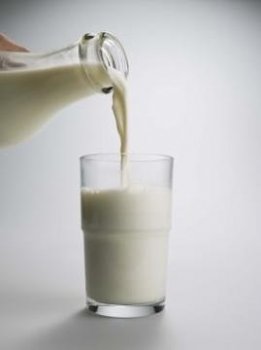
 Casein and lactose are two components of milk
Casein and lactose are two components of milk
Lactose and casein are two different components of milk. Lactose is the sugar found in milk and casein is one of the major proteins. Intolerances to both lactose and casein are prevalent, which can cause a number of unpleasant side effects.
Nutritional Components of Milk
Human milk, cow's milk and other species' milk contain proteins, fats, carbohydrates, vitamins and minerals. Depending on the type of milk, there are different levels of fats carbohydrates and proteins. The protein in cow's milk is composed of approximately 80 percent casein and 20 percent whey - another type of protein. The protein in human breast milk is made up of 60 percent whey and 40 percent casein. Lactose, or milk sugar, is the major carbohydrate in cow's milk and human milk. It makes up 40 percent of the calories in human breast milk and 30 percent calories in cow's milk.
Lactose
Lactose, or milk sugar, is digested by an enzyme in the body known as lactase. Lactase is produced in the bodies of babies so that they can digest breast milk. Some children and adults don't produce enough lactase, which can lead to a condition known as lactose intolerance, where milk sugar is not properly digested. Around 30 million Americans are affected by lactose intolerance by the time they are 20. Lactose intolerance symptoms can occur anywhere between 30 minutes and two hours after ingesting milk products. Symptoms may include nausea, diarrhea, abdominal bloating, cramps and gas.
Casein
The milk protein casein is often referred to as a slow-acting protein because the body takes longer to digest it. Its slow release of amino acids into the bloodstream makes casein protein powders a choice supplement among bodybuilders and athletes. Some people can also be intolerant to casein, which can result in gastrointestinal symptoms such as gas, bloating and diarrhea. A casein allergy can also exist, and it is more rare and serious because an allergy is an immune response. Allergy symptoms can include gastrointestinal symptoms as well as itching, hives, facial flushing, wheezing and strict constriction of airways and anaphylaxis. A person with a milk allergy usually requires medical care.
Considerations
While milk and milk products do have nutrients, the lactose and casein in them can cause problems for some people. If you have an intolerance to lactose or casein or a casein allergy, the only treatment method is to avoid foods containing these components. If you experience more severe symptoms when you consume milk products, see your doctor to be tested for milk allergies.
YOU MIGHT ALSO LIKE




 Bodybuilding is a form of physical exercise and body modification involving intensive muscle hypertrophy. An individual who engages in this activity is referred to as a bodybuilder. In competitive and professional bodybuilding, bodybuilders display their physiques...
Bodybuilding is a form of physical exercise and body modification involving intensive muscle hypertrophy. An individual who engages in this activity is referred to as a bodybuilder. In competitive and professional bodybuilding, bodybuilders display their physiques...








